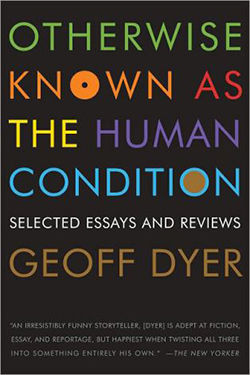Otherwise Known as the Human Condition: Selected Essays and Reviews
by Geoff Dyer
reviewed by Anthony Domestico
At one point in his new collection of essays, Geoff Dyer quotes Auden’s longing for “a form that’s large enough to swim in.” In the past, Dyer’s work has stretched form to the breaking point, mixing fiction with non-fiction, history with autobiography. At times, this tendency to explode generic divisions has bordered on self-parody. In Out of Sheer Rage (1997), Dyer wrote a book about not writing a book about D. H. Lawrence: the end result was a brilliant work of literary criticism. Yoga for People Who Can’t Be Bothered to Do It, a 2003 collection of travel essays with lots of sex and lots of drugs, was perhaps fictionalized, perhaps not. As Dyer gnomically wrote in the introduction, “Everything in this book really happened, but some of the things that happened only happened in my head.”
Dyer’s newest book, Otherwise Known as the Human Condition, is a collection of occasional pieces, and this form proves capacious enough even for Dyer. The book offers an eclectic mix of subjects and styles. We get essays on Rebecca West and the 2004 Olympics, meditations on war photography and a disappointingly tame night spent with the members of Def Leppard. Some of the pieces, especially the book reviews, are tight in construction, others meander, following the author’s thoughts wherever they lead. All, however, offer original, surprising writing. Otherwise Known as the Human Condition is perhaps the purest distillation of Dyer’s personality yet: easily distracted, intensely self-reflexive, and ferociously clever.
While Dyer’s generic pyrotechnics draw the most critical attention, it is his distinctive voice that makes him such a pleasure to read. On the inherent sexiness of hotels, Dyer writes, “A hotel room is horny because it is clean: the sheets are clean, the toilets are clean, everything is clean, and this cleanliness is a flagrant inducement to—what else?—filthiness.” All of Dyer’s stylistic gifts are on display here: the easy humor, the precise diction, the light rhythm, the balancing of the tawdry with the philosophical, or, more accurately, the mining of the tawdry for the philosophical. His prose reads like a cross between Keith Richards and George Orwell: slangy yet clear, somehow both druggy and lucid.
Dyer’s typical method is to circle around his subject, hovering over its surface and approaching it from many different angles. He has a mind particularly well suited to critical introductions, which call for the telling detail or quotation rather than careful exegesis, and Otherwise Known as the Human Condition contains wonderful introductions to Rebecca West, F. Scott Fitzgerald, and others.
If there is a thread to be found in the labyrinth of this collection, it is an intense interest in Geoff Dyer—his likes, his dislikes, his obsessions, his neuroses. The final section of the book, entitled “Personals,” contains several essays on Dyer’s past and present misadventures. At times he’s bemused, as when relating the experience of being fired from his first job (“Get in late, knock off early, and do fuck-all in the interval except steal stationery: that’s my attitude to work”). Elsewhere, Dyer reveals a sincere, though never sentimental, side, especially when remembering his working-class childhood.
Even when writing about other artists, Dyer seems to be really writing about himself. In an introduction to Rebecca West’s hard-to-classify masterpiece, Black Lamb and Grey Falcon, Dyer complains, “Palpably inferior works—novels—sit far more securely on the literary syllabus than an awkward tome whose identifying quality is a refusal to fit.” In a review of Lorrie Moore, he could be describing his own discomfort with “narrative locomotion”: “Moore advances her story while appearing to let it drift sideways, roll backwards, or even, at times, to stall.”
Dyer acknowledges, and indeed celebrates, the ways in which all these pieces lead back to himself. In the collection’s title essay, he begins to describe the food at a New York City café, only to pull back: “I don’t intend dwelling on these sandwiches because what’s important in this parable is me and my state of mind, otherwise known as the human condition.” The tone is typical of Dyer’s writing, as his ironic, self-mocking stance masks what is, for him, a deep truth: the infinite interest of the mind at play.
One is tempted to say that the distractable, proudly solipsistic Dyer is the ideal writer for the Google generation. He prefers to call himself a “late-twentieth-early-twenty-first-century man of letters.” Though I’m hesitant to compare him to any other writer, he reminds me of a modern-day, pot-smoking Montaigne. Like Montaigne, Dyer writes on an incredible range of subjects, but he always ends up where he started: carefully mapping the encounters between an endlessly fascinating world and the self-conscious mind that perceives it.
Published on May 16, 2013

